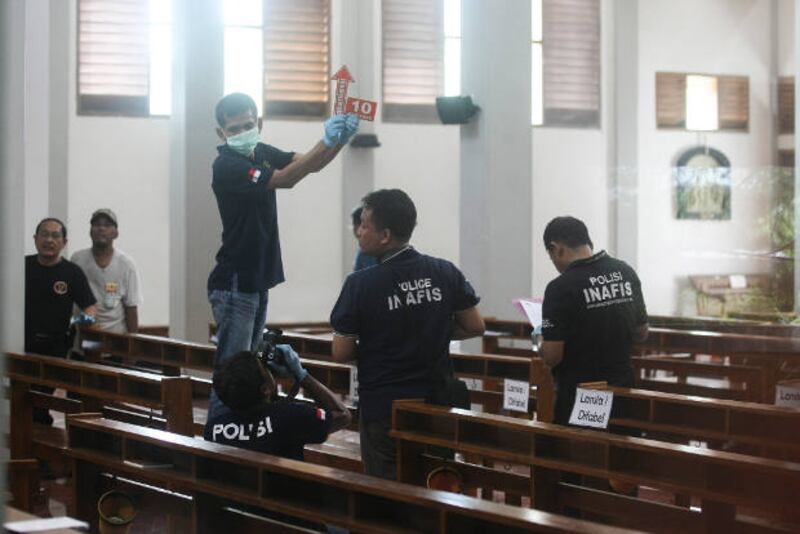Updated at 12:38 p.m. ET on 2018-02-11
Police shot and wounded a sword-wielding man who attacked a church congregation during Mass on Sunday in Indonesia’s Yogyakarta province, injuring five people including a German priest, according to local authorities who said they had not determined a motive.
The suspect and the five others who were wounded at the St. Lidwina Church in Slemen regency were being treated on Sunday evening (Jakarta time) at local hospitals for injuries that were not life threatening. Police said they had not yet interviewed the man in custody to determine why he carried out the attack.
“We are still investigating the case,” Yogyakarta police spokesman Yulianto told BenarNews.
“We haven’t found leads to terrorism yet and it doesn’t seem to be terrorism,” he said, adding that police also had found no evidence the attack was religiously motivated against members of Indonesia’s small Christian minority.
But Gen. Ari Dono Sukmanto Ari, the chief of the national police’s criminal investigation division, said Densus 88, an elite unit often deployed in counter-terrorist operations, would be sent to Slemen to assist in the case "to examine whether this is actually an act of terror or action by an individual as a lone wolf," according to CNN.
Police in Yogyakarta province identified the suspect as Suliyono, a 23-year-old university student from Banyuwangi regency in East Java province.
Apart from the priest, who was identified as Romo Karl Edmund Prier, 80, a German missionary who has lived in Indonesia since 1964, three of the other injured people were churchgoers. The priest suffered cuts to the back of his head and shoulders, according to an eyewitness account.
The policeman who wounded the attacker with two shots to the legs was injured by the man with the Samurai-like sword as the officer intervened to stop the attack, officials said.
According to eyewitnesses, the Sunday morning attack started when the suspect began shouting from outside the church. Then, he burst into the church, allegedly swinging his sword in all directions.
“When he entered, the Mass service had just begun, so all of the congregants were focused on prayers and the priest was at the altar,” said Andhi Cahyo, a congregant.
A video of the incident posted on the social media platform WhatsApp showed the suspect dressed in black standing near the altar with his sword and a bag slung over a shoulder, as others appeared to order him to stand down.
“Everybody started panicking and screaming. I was scrambling to save my wife and children,” Cahyo told Agence France-Presse.
According to reports, the suspect also damaged statues of the Virgin Mary and Jesus Christ, as well as destroyed some books in the church.

City of Education
The church lies near the provincial capital of Yogyakarta, which is located on Java island and known as the City of Education because of its rich concentration of universities and cultural institutions.
Indonesia, the world’s largest Muslim-majority country, is known for its long tradition of religious tolerance and embracing different faiths. But the atmosphere has grown more hostile lately as members of the small Christian minority have been targeted in recent attacks by militants and in religion-fueled campaigns by conservative groups from the majority.
In August 2016, a priest was injured by another knife-wielding man in what appeared to be a botched suicide-bombing attempt at a church in Sumatra, also during Sunday prayer services. In November that year, a small girl was killed in a Molotov cocktail attack at a church in Kalimantan that injured three other children.
And in late 2016 and early 2017, massive street demonstrations by hardline religious organizations called for Jakarta Gov. Basuki “Ahok” Tjahaja Purnama, an ethnic Chinese Indonesian and Christian, to be prosecuted over public comments that were deemed as and anti-Muslim and therefore blasphemous. The protests contributed to his losing last year’s gubernatorial election and being convicted and sentenced to two years in prison on a blasphemy charge.
After Sunday’s attack, the chief of Yogyakarta branch of the Ministry of Religious Affairs, Lutfi Hamid, appealed to all parties to refrain from further violence.
“It is very heartbreaking. It happened when society and government are building harmonization between religious and many elements in the society. Whatever the reason for this is intolerant behavior,” he told reporters.
